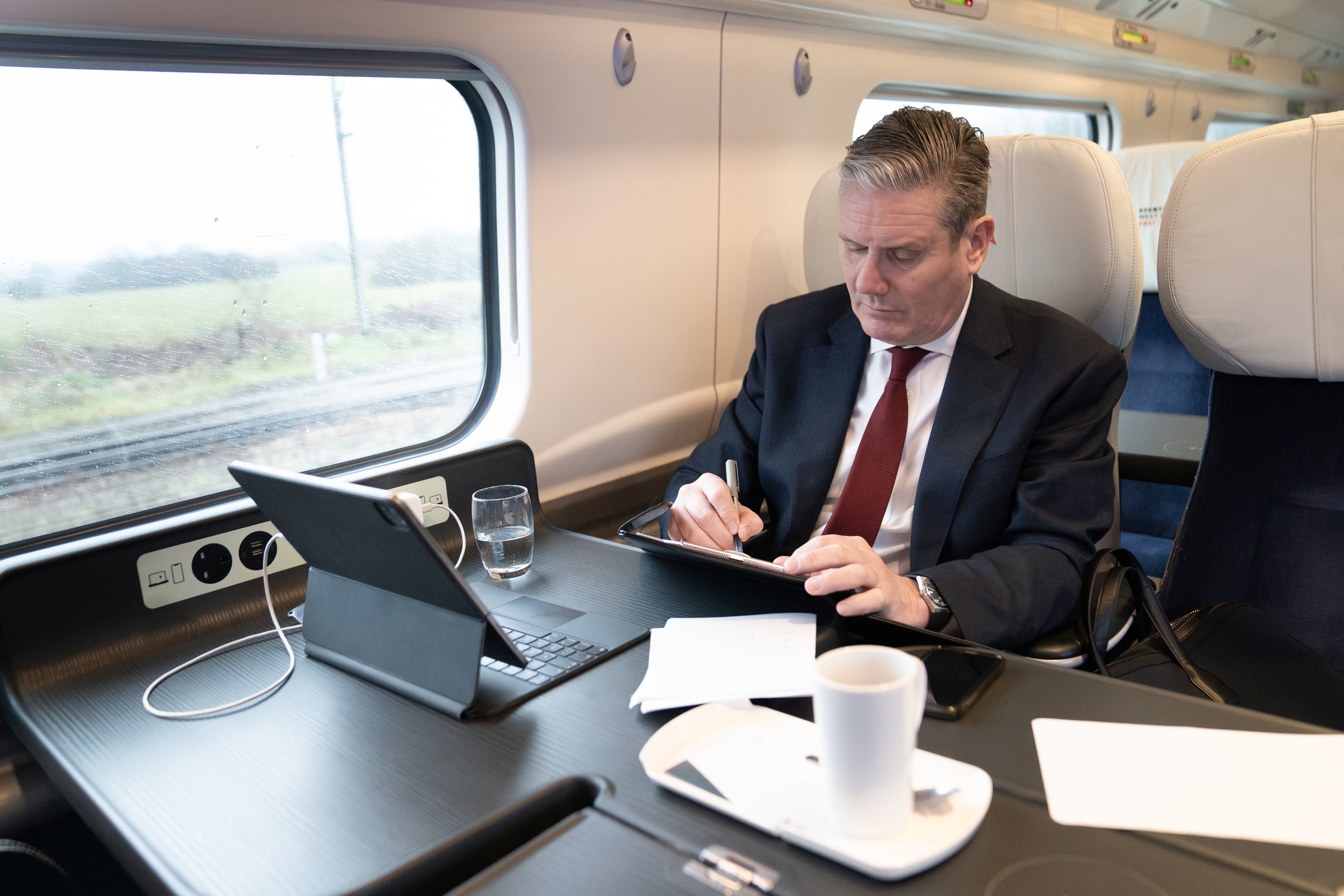So Labour’s going to fix our shambolic rail network? Good luck with that!
The party’s pledge to transform our broken transport system is admirable, writes Simon Calder – but when it comes to how exactly it plans to do it, there seem to be more questions than answers


Getting Britain Moving: Read the full document on how Labour will fix Britain’s railways.” With a desperation shared by millions of train travellers keen to understand what the probable next government plans to do with the financial and operational shambles that is UK rail, I clicked on the “download” link. Up popped a smiling picture of Sir Keir Starmer and the message “Let’s get Britain’s future back”.
Over repeated attempts, I kept being taken back to the Labour Party’s home page.
The nation needs no better metaphor for the endless doom loop on which Britain’s diminishing railway and its hapless passengers appear destined to ride.
While I await further details of the party’s rail policy, I shall piece together what I can from the speech by shadow transport secretary Louise Haigh and the sketchy details available at labour.org.uk.
At the heart of Labour’s plans: a body that already exists, Great British Railways. Dozens of hardworking rail experts are already employed at Waterloo station in London as the “transition team” to establishing a guiding mind for the railway. Establish an arm’s-length body free of Department for Transport (DfT) micromanagement, and passengers will be better served.
So why hasn’t it happened yet? Mainly, the sheer contempt in which Rishi Sunak holds the railway. Last year the prime minister cheerfully demolished many years of cross-party agreement on the need for HS2 to transform infrastructure in the North; he halved air passenger duty for domestic passengers, encouraging a switch from rail to air; and he has been content to see the train drivers’ strikes drag on for a third summer.
In contrast, Labour loves railways. The party plans to “fix our railways for the benefit of passengers and the taxpayer”. One way to do that: nationalisation.
Jeremy Corbyn’s 2019 Labour manifesto contained one big idea that was favoured by a substantial majority of the public: nationalising Britain’s railways.
Five years on, the opposition has understandably chosen a refrain. But as many commentators have been trying to tell the Labour Party, the problem with promising to nationalise the railways is that it’s already happened.
By April 2020, the Covid pandemic had seen rail revenue evaporate. While health officials urged travellers to stay away from the almost-empty trains running diligently around the country, the Department for Transport (DfT) abandoned the franchise system and is instead running everything, telling private companies what services to provide and paying them a couple of per cent in return.
Sure, that relatively small saving could help – but the debate over the costs and benefits of some outsourcing is far removed from assessing the prime causes of the deteriorating health of the railway.
Labour’s top line is reliability, “so that people can have confidence in their journey”. For that, Network Rail has to invest much more in maintenance. And train cancellations due to staff shortage will have to end. I am not sure I understand how Labour will do that without pouring extra billions into what strikes many as a bottomless pit.
Next: tickets should be affordable “so that prices are kept, wherever possible, at a point that works for both passengers and taxpayers”. Note that wiggle-phrase, “wherever possible”. The taxpayer is currently paying £240 per second to keep a frankly lousy railway sort of running.
Revenue is way below cost, and with the current unreliability caused by rotting infrastructure and striking train drivers, a sharp increase seems fanciful. So the focus must be on cutting costs – which is tricky if you are promising the electorate the railway moon.
Labour must convince the unions that the system will continue to shrivel unless the whole miserable mess is made more efficient – and that the taxpayer is cheesed off with an absurd level of subsidy. The notion that striking is a worthwhile investment because history shows the government always caves in to the rail unions cannot stand.
Fares reform is something that every government this century has said it will tackle but none of them has – mainly for fear of upsetting the voters in marginal constituencies whose tickets will cost more. Labour needs to be honest: for the system to work properly, some people will need to pay more.
Why, for example, should everyone who turns 60 – even if in a steady job – save one-third on train tickets while those between 31 and 59 must pay full fare? The Senior Railcard is just one of many sacred cows blocking the line to recovery: surely it makes sense to bring down ticket prices for all instead.
Other Labour ideas are merely tinkering: “automatic delay refunds” already happen on state-run LNER, and in any case, passengers would much prefer the trains to run on time to begin with.
The next transport minister will be handed the most toxic of chalices. The travelling public – as well as transport journalists – will hold them to account. Labour must show courage or, like the current lot, merely preside over more ill-managed decline.






Join our commenting forum
Join thought-provoking conversations, follow other Independent readers and see their replies
Comments